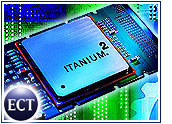
Credit cards remain the predominant mode of payment in e-commerce, but other online transaction methods have entered the market in recent years.
Some of these methods — such as Flooz, which attempted to emulate online currency — did not fare well. But another type of transaction system, in which a company serves as an intermediary between buyers and sellers to ensure that goods are paid for and received, has done much better.
Experts say this type of mediated payment service — also known as person-to-person (P2P) service — is particularly successful at online auction sites, where thousands of buyers and sellers come together daily. The clear winner in serving this market has been PayPal.
Rising with eBay
Gartner vice president Avivah Litan told the E-Commerce Times that PayPal’s success is attributable in large part to its relationship with customers of Web auction giant eBay.
As eBay’s customer base has grown at a rate of 20 to 30 percent a year, Litan said, PayPal has steadily built its own following and now boasts more than 15 million users.
“PayPal has definitely managed to ride the wave of eBay’s success,” Litan noted.
In fact, the symbiotic relationship between the two companies has fueled recent reports that eBay might purchase PayPal. Although no merger or buyout plans have been confirmed, Litan said such an outcome would be a realistic scenario.
PayPal’s success, in fact, has outstripped that of BillPoint, a similar service already owned by eBay, which recently bought out former partner Wells Fargo’s interest in the company.
Beating Out Rivals
Experts noted that PayPal also has outmaneuvered a number of other rival services, including CyberCash, which VeriSign recently bought.
Giga Information Group senior industry analyst Penny Gillespie told the E-Commerce Times that PayPal has a number of other P2P competitors, many of which are backed by major corporations, still looking to emulate its success.
These rivals include Yahoo’s DirectPay, Citibank’s c2it and Bank One’s eMoneyMail. The field also includes MoneyZap, a service provided by Western Union, and First Data.
In addition to auction settings, Gillespie said, P2P services are seeing increased use in small businesses and also are used frequently to make donations to charities.
Obstacles Ahead
Gillespie noted, however, that PayPal and its rivals must overcome a number of obstacles before they can challenge credit cards in terms of overall online use.
Although the company has taken steps to deal with fraudulent sales practices in the auction arena, Gillespie said, PayPal is not bound by the same government regulations as banks in monitoring sellers, especially those who might represent foreign interests.
To build better trust in P2P systems, Gillespie said online payment companies may need to set up an end-to-end verification system, similar to one now used in Canada, in which financial institutions confirm the identities and business status of buyers and sellers.
Another option, Gillespie added, might be to set up escrow services, such as those usedin home-buying transactions, in which buyers and sellers could place funds pending resolution of disputes.
Plastic Still Rules
Meta Group vice president Gene Alvarez told the E-Commerce Times that companies like PayPal have done a good job of turning P2P services into “trusted intermediaries” in auction settings.
But he noted that these services still cannot approach credit cards — which offer built-in fraud protection, limits on liability in cases of theft and overall consumer familiarity — as the top method for online payments.
“In the past year, maybe one or two of my clients have asked me about these P2P systems,” Alvarez told the E-Commerce Times, noting that interest among larger companies is limited at the moment.
For now, according to experts, PayPal continues to lead the P2P pack through a combination of the right services and a profitable business model.
Aiming Smaller
According to Yankee Group analyst Lisa Cebollero, PayPal’s services include a feature that lets users keep an account balance with the company and use those funds to make payments to others. The company also offers an ATM/debit card that can be used to withdraw funds, in addition to credit card options for transactions.
Such offerings are advantageous to smaller businesses that cannot afford the costs of credit card processing but that need good tracking of transactions, she said.
“The same functionality used in a P2P payment system is, in most cases, sufficient technology for small businesses or home offices not processing a large number of transactions,” Cebollero said in a research report.
Gartner’s Litan noted that PayPal also has begun offering services similar to those provided by financial institutions, such as revenue-sharing incentives for those using certain bank debit cards and interest-bearing alternatives for customers setting up cash accounts.
On the profit side, Litan said, rivals have yet to match the 50 percent margin that PayPal enjoys on each transaction. This margin is possible because the company charges sellers 3 percent of proceeds and uses internal initiatives to reduce processing costs to slightly more than 1 percent of each transaction — much less than it costs banks to process credit card sales.















































Social Media
See all Social Media